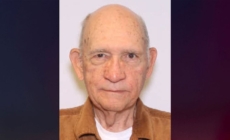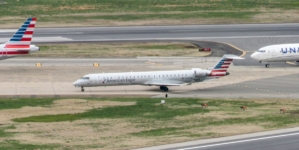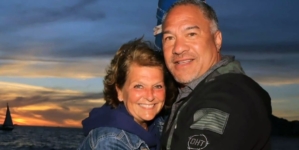-
80-year-old man allegedly fatally shot 11-year-old neighbor and then admitted to killing his wife - 24 mins ago
-
Trailers that drew squatters in L.A. County appear in Riverside County - 28 mins ago
-
Weather Balloon Cuts Raise Alarm: ‘Not a Good Sign’ - 32 mins ago
-
Spencer Torkelson smacks a two-run double as Tigers take lead over Royals - 42 mins ago
-
Honda to shift Civic Hybrid production to U.S. from Japan - 44 mins ago
-
Burglars cut alarms, cameras before Los Angeles jewelry heist - about 1 hour ago
-
Phoenix Ikner’s Mom Warned Parents About Not Disciplining Kids - about 1 hour ago
-
Texas man allegedly killed and disemboweled his father, who he claimed was an alien - about 1 hour ago
-
Can Trump or the IRS strip Harvard of its tax-exempt status? Here’s what to know. - about 1 hour ago
-
Gunnar Henderson smacks solo home run, giving Orioles early lead over Guardians - about 1 hour ago
Frontier CEO is ‘optimistic’ about tourism industry despite economic uncertainty
Despite a downturn in foreign tourism and broader economic uncertainty, Frontier CEO Barry Biffle remains optimistic about the budget airlineâs future.
âPeople think that thereâs some kind of Armageddon going to happen,â Biffle said in an exclusive interview with âNBC Nightly Newsâ correspondent Hallie Jackson that airs Sunday. âI think that as we look here today, Iâm optimistic.â
Travel experts have been sounding the alarm amid President Donald Trumpâs global trade war, warning that a year that was initially projected to be profitable for the tourism industry could instead face an economic downturn.
Before Trump announced a 90-day pause on most of his proposed tariffs, Delta CEO Ed Bastian told CNBC last week that air travel has all but stalled for both leisure and business travel.
âI think everyoneâs prepared for uncertainty,â Bastian said. âIf that continues and we donât get resolution soon, we probably will end up in a recession.â
Biffle acknowledged the bleak outlook shared by those in the airline industry.
âWhatâs become clear is, obviously, thereâs been some challenges with travel demand, and weâve seen it in all industries now. Hotels, airlines, cruise lines are seeing less bookings,â he said.
However, Biffle believes Frontier’s ultra-low-cost model positions it to thrive, especially as consumers become more price-conscious. He likens Frontier’s appeal to that of retailers like Walmart, suggesting that when the economy is down, value-oriented businesses tend to perform better.
âWhatâs happened is thereâs going to be a massive reversal of fortune,â he said. âOver the last several years, the legacy carriers have done very, very well at the expense of us, but thereâs now too much domestic supply.â
âIn any type of recessionary or kind of economic challenge environment â the âWalmart effect,â you know â businesses like ours do well,â he added.
Amid economic uncertainty and stricter immigration policies, overseas travelers are increasingly canceling trips to the United States. According to the National Travel and Tourism Office, international travel to the United States was down 12% in March compared with a year ago.
âRight now, weâre seeing boycott travel to the United States out of Europe,â Biffle said. âSo can you imagine maybe not 70% â if itâs just down 20%, thatâs a massive market. This is a huge challenge.â
Biffle predicted that the hottest travel spots for Americans this summer will be domestic locations.
âDomestic is in vogue again because of a lot of things going on in the marketplace,â he said. âAnd so I think youâre going to see a lot of people travel all over the United States this summer.â
To adapt to current market conditions, Frontier is implementing strategic changes. It has revamped its pricing strategy by introducing bundled fare options, including offerings with extra legroom and empty middle seats. Frontier also plans to attract more domestic travelers by offering first-class seats later this year. In addition, Biffle touted the airline’s plans to eliminate bag fees this summer.
The bag fee move appeared to be aimed at Frontier competitor Southwest Airlines, which announced last month that it would begin charging for checked bags. The decision sparked outrage among consumers.
Biffle also raised worries about a shortage of U.S. air traffic controllers, a concern shared by aviation safety experts, particularly after the fatal midair collision between an American Airlines passenger jet and an Army helicopter in January.
âOn a normal day with no weather, itâs generally not that big of a challenge,â Biffle said. âHowever, Iâll take Florida as an example â Christmas, New Yearâs, Presidents Day, spring break, weekends, if you mix any kind of weather with that, we have cancellations across the industry, and the reason for it is we exceed the capabilities of all of the air traffic controllers there.â
But Biffle said he is confident the Trump administration is working to reduce the shortage, and he maintained that air travel is âthe safest way to travel, and I think that weâre getting safer.â
Source link





















